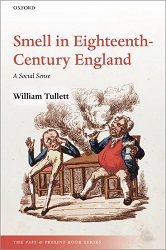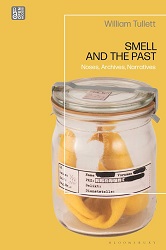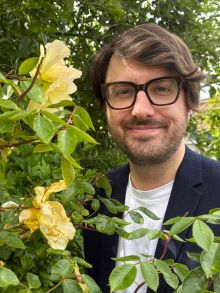Will Tullett
Senior Lecturer in Early Modern History
Impact Officer
Visit Will Tullett's profile on the York Research Database to:
- See a full list of publications
- Browse activities and projects
- Explore connections, collaborators, related work and more
Profile
Biography
BA University of Oxford; MA and PhD King’s College London
 |
 |
Departmental roles
Impact Officer
Research
Overview
Will’s research and teaching are located at the intersection of sensory, embodied, and environmental history. His research has principally focused on the history of smell – briefly dabbling in histories of sound and listening – and he continues to work towards the development of an interdisciplinary field of ‘smell studies’.
Initially, Will’s work emerged from an interest in the history of the body in the long eighteenth century. This has been reflected in articles on gender and perfume in public space and his more recent work on the bodies of badly-behaved bell ringers in 1730s London. However, in recent years his work has increasingly centered on environmental histories that place questions about agency, materiality, and more than human actors alongside sensing bodies. This interest has resulted in chapters and articles on subjects that include the sensory patina of ephemera in eighteenth-century London and the history of ‘thresholds’ in psychological, environmental, and historical research from the 1800s to the present.
Projects
Will’s first book, Smell in Eighteenth-Century England, examined the relationship between smell and gender, consumption, and urban space in the period from the 1660s to the 1830s. It argued that whilst smell’s epistemological role in medicine, chemistry, and sanitation altered markedly over the eighteenth century, the use of one’s nose became ever more important in the social life of the senses. In particular, the eighteenth century witnessed the emergence of new ideas of ‘privacy in public’, which we now refer to as ‘personal space’, that were experienced and managed through smell. During the next few years Will spent time working on the emotional politics of sound and listening in eighteenth-century Britain. This resulted in a number of pieces on bell ringing and the acoustic rhythms of late eighteenth century London. He still has soft spot for antiquarian bell-ringers.
From 2021-2023 Will has been a work-package lead on the EU Horizon 2020 funded project Odeuropa. As part of this project, he has put together the first ever ‘Encyclopedia’ of smell history and heritage, helped to develop a ‘Smell Explorer’ tool for browsing references to smells in historical texts, and was involved in producing a number of public engagement events including a smell tour of Amsterdam complete with a scratch ‘n’ sniff card and accompanying mobile app. The Odeuropa project also led to Will’s second book Smell and the Past: Noses, Archives, Narratives, which came out in 2023. This argues that historians should use their noses in their work and makes the case for smells as a new way of disseminating historical research.
Will is currently working on several new projects. One of these is a project with Dr Cecilia Bembibre at University College London and Dr Kate McLean at the University of Kent on smell history and heritage in post-1945 Britain, which aims to trace the influence of longer-running histories of smell on contemporary British culture and society. A second project focuses on the history of animals and smell – and the role of odour as communicative medium between species – from the 1600s to the present. As part of this project Will aims to develop new, less anthropocentric, concepts for thinking about smell and the past. Finally, Will has an ongoing interest in sensory education and the education of the senses in the early modern and modern periods. He is particularly interested in histories of how people have learnt sensory habits, skills, and memories in childhood that go on to inform their adult life.
Aside from the stuff he finds at the end of his nose, Will also has a variety of other ongoing research interests that connect his historical research with contemporary and even futurological issues. Between 2020 and 2021, he held several small collaborative ‘Knowledge Frontiers Forum’ grants from the British Academy for projects on nineteenth-century visions of the future and the sensory experience of the pandemic.
Supervision
Teaching
Undergraduate
An example of modules taught:
- HIS00130I Public History Project
- HIS00175I Elemental Histories: Early Modern Environments
- HIS00139H Beauty
Postgraduate
An example of modules taught:
- HIS00050M Public History Placement
- HIS00177M Smell and the Past: Noses and Environments from the Rome to Virtual Reality
Other teaching
External Activity
Will is a fellow of the Royal Historical Society and a leader of the ‘Past Scent’ network. He has reviewed grant applications for both national and international funding bodies, book proposals and manuscripts for academic and trade publishers, and articles for academic journals covering history, sensory studies, the medical humanities, and the environmental humanities. Will is happy to hear from museums and heritage sites who are interested in smell-based collaborations.
As a historian with a keen interest in public engagement, Will has extensive experience of work with newspapers, radio, and TV. Very recently he has appeared (or is appearing) on Tony Robinson’s ‘Cunningcast’ podcast chatting about past smells, a BBC Radio 3 Free Thinking episode on noses, and the series Inside the Factory – where he discussed the history of perfumery. He is very happy to talk about smell, odour pollution, perfume, and other related topics in podcasts, on the radio, and on TV.
Publications
Contact details
Student hours


